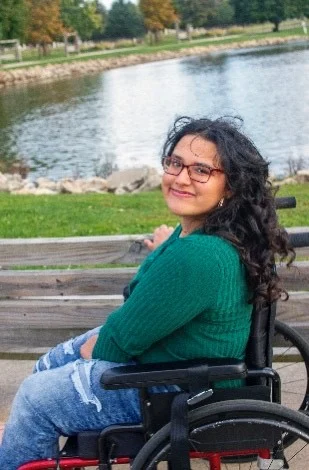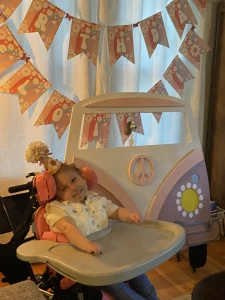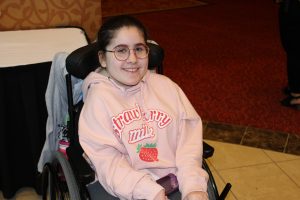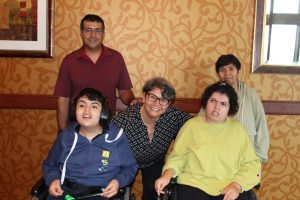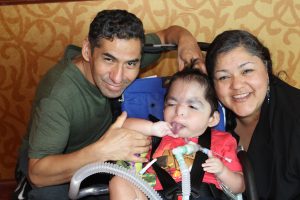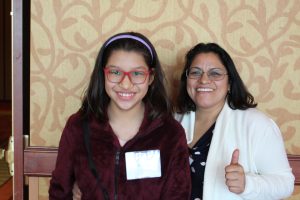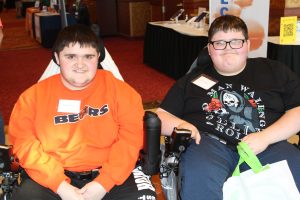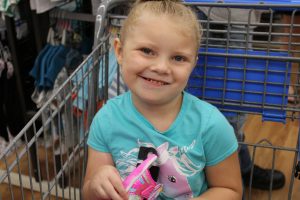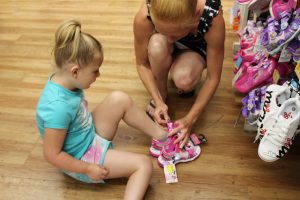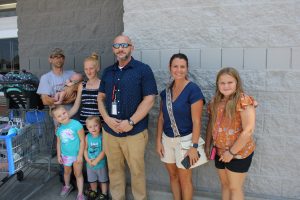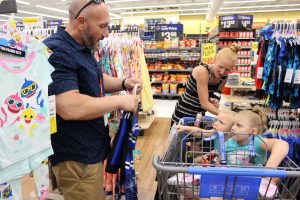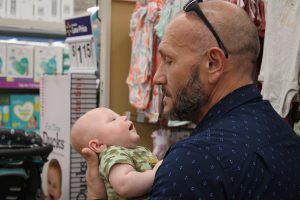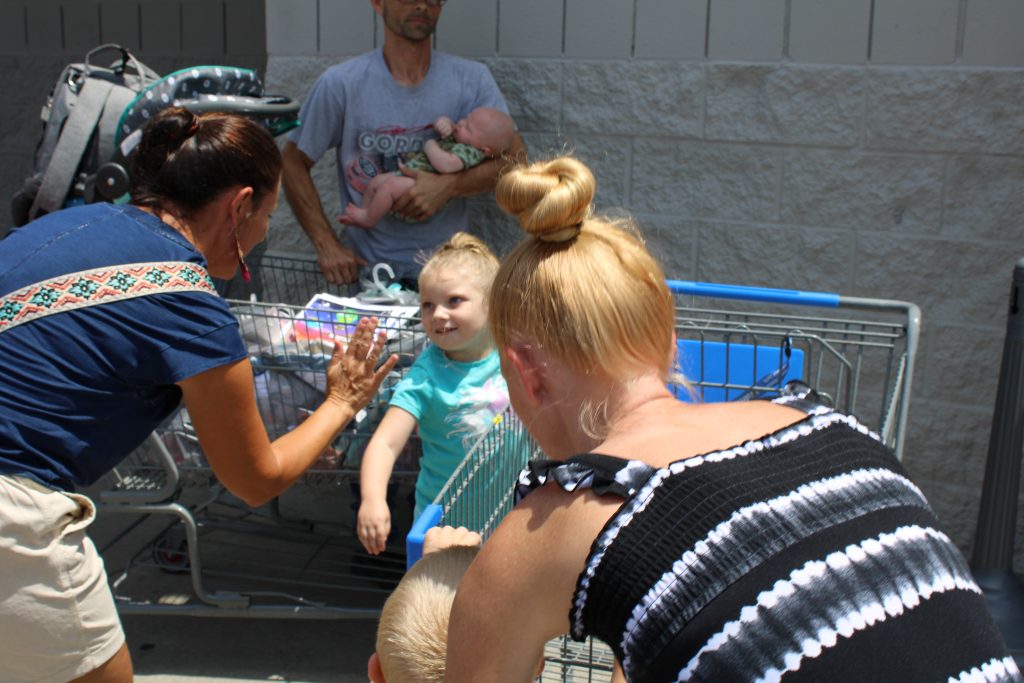New Health Insurance Education Series Open to All DSCC Families
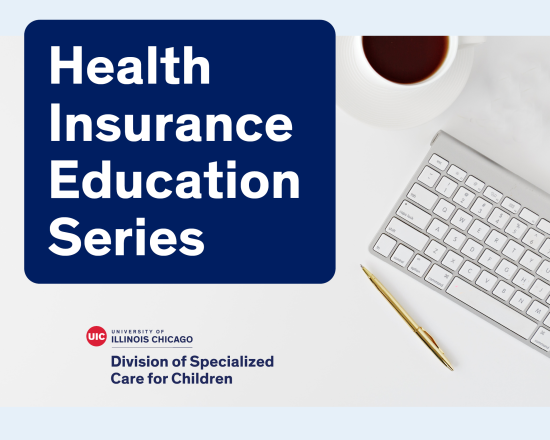
Free virtual training sessions in English and Spanish for Division of Specialized Care for Children participants, their families and all who are interested
Navigating the health insurance maze can be frustrating.
We’ve heard our participant families’ feedback and want to help improve the process.
Please join the University of Illinois Chicago’s Division of Specialized Care for Children (DSCC) for our new education series on important health insurance topics.
These free, family-focused sessions will help you better understand your coverage and benefits.
Sessions are virtual and open to DSCC participants, their families/caregivers and anyone interested in these topics.
The DSCC Health Insurance Education Series is the result of DSCC families’ questions and suggestions from our Family Advisory Council.
Our Benefits Management and Research (BMR) team will explain a different topic and answer your questions each month. They will present each session in English and in Spanish via Zoom.
Save the date for each session:
- Understanding Your Insurance
English: March 7, 6 p.m.
Spanish: March 8, 6 p.m.This training will help you understand your health insurance. It will go over the types of insurance plans and some important words to know. You will also learn what to do if you have many insurance plans and how to find a doctor.
Sign up for Understanding Your Insurance in English
Sign up for Understanding Your Insurance in Spanish
- Medicaid Eligibility and Coverage
English: April 11, 6 p.m.
Spanish: April 12, 6 p.m.This training will help you learn about Illinois Medicaid programs. It will discuss who can have Medicaid and the programs for children and adults. You will learn what Medicaid covers and how to keep Medicaid coverage through the yearly redetermination process.
Sign up for Medicaid Eligibility and Coverage in English
Sign up for Medicaid Eligibility and Coverage in Spanish
- Insurance Appeals
English: May 9, 6 p.m.
Spanish: May 11, 6 p.m.This training will cover information on health insurance appeals. You will learn what to do if your insurance doesn’t approve a service. You will also learn more about the appeal process and how to write an appeal letter. Examples will be available.
Sign up for Insurance Appeals in English
Sign up for Insurance Appeals in Spanish
Details about each series session are also posted on our Events page.
Each session will be recorded. You can access the recordings and related materials on our Family Education Webinars page.
There is no cost for families to participate.
If you have questions before or after a session, please email dscc@uic.edu or fill out our Contact Us form.
We hope you’ll join us!
Permanent Home Care Program Changes Give Families More Flexibility and Support
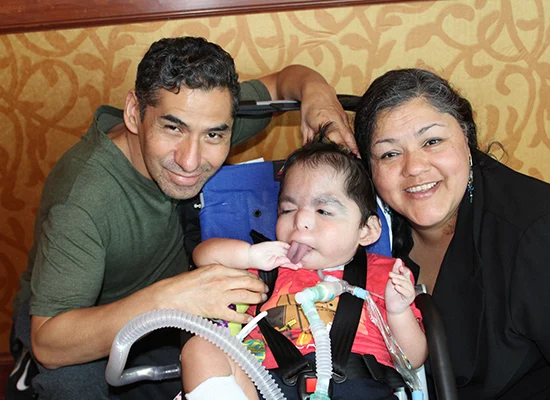
Paid licensed caregivers and nurse overtime are now permanent options for Home Care families
We have exciting news about long-term changes to the Home Care Program. We have listened to our participant families and made two pandemic-related benefits permanent. These changes can provide continued flexibility and support beyond the public health emergency.
When the COVID-19 pandemic began in March 2020, UIC’s Division of Specialized Care for Children (DSCC) partnered with the Illinois Department of Healthcare and Family Services (HFS) to address our Home Care families’ needs. Together, we set provisions included in Appendix K. Appendix K is an emergency coverage document for individuals receiving services through a Medicaid waiver.
We continued to partner with HFS to make two provisions permanent for Home Care participants. As a result, nurses can continue to provide overtime. Licensed parents/legally responsible adults (LRAs) can also remain paid nurse caregivers for their children enrolled in Home Care.
Below are more information and guidelines on these new permanent changes.
Licensed (RN or LPN) Parent/LRA Paid Caregivers
Parents or LRAs, including foster parents, can provide skilled nursing services to their children if they hold an active registered nurse (RN) or licensed practical nurse (LPN) license.
This approval includes participants enrolled in medically fragile, technology-dependent (MFTD) waiver services and non-waiver services. This approval is for all children approved for Home Care services, regardless of the child’s age.
Guidelines include:
- The licensed parent/LRA must be a nurse employee of a DSCC-approved nursing agency. The nursing agency sets the number of hours the parent can work each week.
- Services may begin on the licensed parent/LRA’s hire date.
- The licensed parent/LRA must meet all nursing agency rules for provider qualifications and training.
- The licensed parent/LRA can work overtime hours. Overtime is anything over 40 hours a week.
- The licensed parent/LRA must hold an active RN or LPN license.
- Licensed parents/LRAs may not provide respite services under the waiver.
- Licensed parents/LRAs cannot receive reimbursement for nurse training.
- The total nursing hours may not exceed the approved resource allocation.
Overtime
Nursing agencies will permanently receive payment for overtime hours to Home Care participants. Overtime hours benefit the participant and family. They also allow nurse caregivers to provide more nursing coverage to participants. The possibility of overtime also incentivizes the nurse caregiver to provide more coverage. Overtime allows nursing agencies to cover more authorized hours while stretching their staffing over fewer nurses. This is especially helpful to families during a time of increased demand for nurses.
Guidelines include:
- Under the Fair Labor Standards Act, overtime is anything over 40 hours a week.
- The Nurse Practice Act prohibits working more than 16 hours in a 24-hour period. An eight-hour break between shifts is also mandatory.
- Overtime is defined as time-and-a-half.
- Overtime reimbursement comes from the approved resource allocation. The amount billed cannot exceed the HFS-approved resource allocation.
- Those on the MFTD waiver cannot use overtime when using respite hours.
- Parents/LRAs who are nurse paid caregivers can work overtime. The parent/LRA is an employee of the nursing agency. The nursing agency determines the number of hours the parent can work each week. The number of hours cannot exceed the approved resource allocation.
- Nurses can only be eligible for overtime when Medicaid is the payer. When private insurance is the payer, nurses cannot receive overtime pay.
Please contact your DSCC Care Coordinator with any questions or concerns.
We hope these permanent changes will continue to benefit your family.
DSCC Teen Starts Podcast on Disability
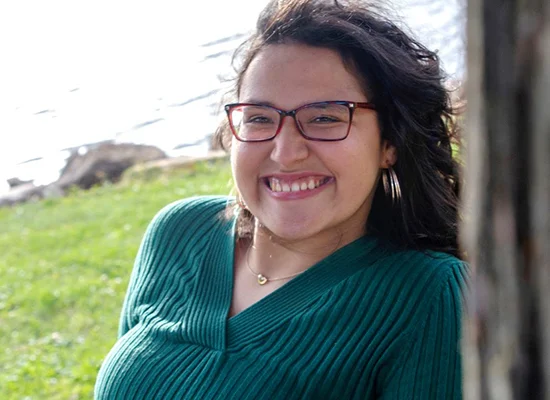
Petra Petty hopes to promote greater understanding and disability representation
Petra Petty says she’s fought for greater understanding and representation of the disability community her whole life.
The 17-year-old Kewanee high school student was born with cerebral palsy and uses a wheelchair. As she’s grown, she’s advocated for greater accessibility in her school district’s buildings. She also successfully pushed for a wheelchair swing at a local park playground.
She’s also passionate about other social justice issues and being an advocate for others.
Now Petra gets to share this passion and her experiences with a wider audience.
Petra recently started a podcast called “Roll With It.” The podcast focuses on living with a disability, current events, pop culture and more.
“I always had a desire to start one,” Petra said. “I’ve always loved talking about my opinions, and I’ve always been on social media, but I felt like I needed a longer form to share my thoughts. So, I just decided to make one. And I really love podcasts.”
Petra is a participant in the Division of Specialized Care for Children (DSCC). DSCC partners with families to help them find the right services and resources for their child’s special healthcare needs.
Petra says DSCC has helped her family with insurance coverage issues and how to navigate the healthcare system as a whole. As Petra has grown, she gets to speak with her DSCC Care Coordinator herself during regular check-ins.
“I really love talking to her and having someone to ask questions to and who I can also relate to,” Petra said of her current Care Coordinator Sarah Kelly. Sarah also has a disability and uses a wheelchair. “It helps a lot.”
Petra started the “Roll With It” podcast in September. She started with weekly episodes and took a short break during her high school exams and the holidays. She thinks of different topics to cover by drawing inspiration from current events, feedback from her social media followers and daily life experiences.
“People don’t understand disability,” she said. “I talk about the struggles and the dynamics of it. I want to show non-disabled people how it really is and not just what they think it is.”
Petra’s received great feedback so far.
“I have classmates that listen to it and teachers,” she said. “People have been supportive.”
Petra is also noticing a difference within herself since starting the podcast.
“I’ve learned how to be more open and honest and be less afraid. It’s given me a lot of confidence,” she said.
“Roll With It” is available on Spotify and Amazon Music.
Petra is excited to see where it leads. She currently plans to go to college and major in psychology and minor in political science or social justice.
Petra was also recently selected to join the Girls Committee of the Illinois Council on Women and Girls. Lt. Gov. Julianna Stratton chairs the council, which advises Gov. JB Pritzker and the General Assembly on policy issues affecting women and girls.
Participants on the council’s Girls Committee share their experiences and perspectives to help make Illinois a place where all girls can thrive.
Petra said she hopes to continue to be a force for positive change through the council.
She also encourages other teens to not let fear or doubt hold them back from trying something new and sharing their voices.
“If it doesn’t work out, it doesn’t work out,” she said. “You never know until you try.”
You can learn more about Petra’s background and podcast in this news article from the Kewanee Star Courier.
Congratulations, Petra!
DSCC Toddler’s Birthday Celebration Benefits Hospital Patients
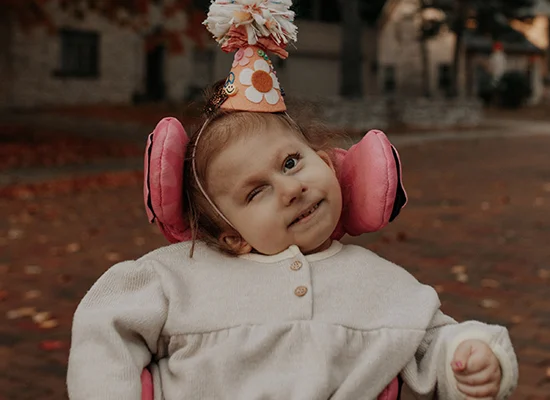
To celebrate Eloise turning 3, her family threw a “groovy” birthday party to provide comfort and treats for patients and their families at OSF Children’s Hospital of Illinois
Birthdays are major milestones in every child’s life. For families of children with rare diseases, they’re especially precious.
Eloise was diagnosed with alobar holoprosencephaly when her mom, Rachel, was 20 weeks pregnant. This congenital condition causes a developing baby’s brain to not properly separate into the right and left hemispheres (halves).
“There are several types of holoprosencephaly and alobar is the most severe. We had no idea if she would be born alive or how long she would live,” Rachel said. “She spent 20 days in the NICU (neonatal intensive care unit) before going home on hospice just before COVID-19 hit.”
Her first birthday didn’t seem possible, let alone future birthdays. But Eloise defied the odds. The Division of Specialized Care for Children (DSCC) participant moved from hospice to palliative care. Eloise is now a feisty 3-year-old who brings joy to everyone she meets, Rachel said.
To celebrate Eloise turning 3 in November, her family planned a special birthday party to benefit the patients and their families at OSF Children’s Hospital of Illinois. The party, dubbed “Eloise Fest – Let’s Get Groovy,” provided plenty of treats and gifts from local businesses. The celebration also donated new sound machines to create a more calming setting for families.
“The party was a way to give back and celebrate something we never dreamed possible,” Rachel said.
Eloise has spent time in nearly every pediatric unit of OSF Children’s Hospital. Rachel and her husband, Zach, got the idea for Eloise Fest when they noticed some of the hospital rooms didn’t have sound machines.
“Eloise’s first and second birthdays we raised money for the Carter Centers for Brain Research in Holoprosencephaly and Related Brain Malformations. This year we wanted to do something more tangible,” Rachel said.
“It may seem like a small thing but hearing the beeps and monitors all the time can be really stressful for families and patients. A sound machine helps provide calm by drowning out the medical stuff. During our stays, we usually set our machine on the ocean setting and it helps provide a sense of calm that’s hard to come by in a hospital. We wanted to help other families have that same sense of calm.”
Rachel and Zach worked with the hospital to find out how many sound machines each department needed. The couple then posted a wish list for their family and friends to buy 92 sound machines and related supplies. They fulfilled the wish list within three days.
“It was so touching to see how many people are impacted by Eloise’s story and are there supporting and loving her,” Rachel said.
Eloise’s “groovy” themed party also included her favorite music playlist and a VW bus photo station that traveled from floor to floor. Local businesses also donated an array of food and non-food goodies for patients and staff.
“This has been three years we didn’t know that we would get,” Rachel said. “I’m grateful for the team that we have surrounding us that includes doctors who understand and all the support our friends, family and DSCC provides. How else would we have gotten here?”
You can see more photos from Eloise Fest and the list of local business donors on OSF Children’s Hospital’s Facebook page.
Read more about Eloise’s powerful journey on our Family Stories page.
New Improvements to DSCC Family Surveys
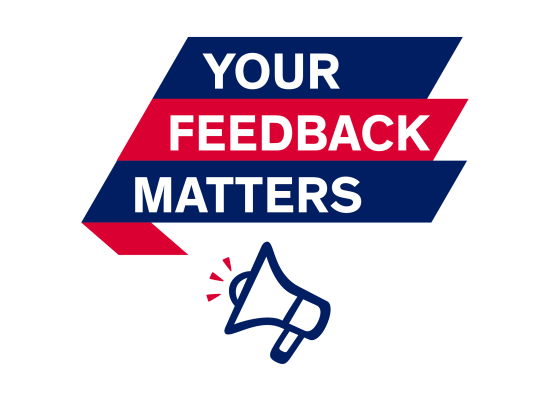
Updates make it simpler and more convenient for our participant families to share feedback
Our participant families are important to us, and your feedback matters. We’ve updated our family survey process to make it easier for you to share your thoughts about our services.
All participant families receive a series of surveys at certain points in their child’s journey with the Division of Specialized Care for Children (DSCC).
We’ve simplified the process so all families will receive our annual survey at the same time. We will also send you fewer surveys throughout the year.
On Feb. 15, you will receive our updated annual survey. This survey replaces the questions you previously received on your enrollment anniversary.
All families will receive this annual survey every February, regardless of enrollment date.
The survey asks how well DSCC team members are supporting your family and meeting your needs. It also asks about:
- Your contact preferences
- How and when you’d like to meet with our team
- How well our staff communicates with you
How Your Feedback Makes a Difference
Your responses will help us strengthen your services. It also informs our decisions about DSCC policies and procedures that affect your family.
Our surveys are optional, but we strongly encourage you to share your experiences. We want to ensure we’re doing all we can to help you meet your family’s needs and achieve your goals.
We make it a priority to not only listen to our participant families but to follow up on your ideas and concerns.
Recent and ongoing improvement projects that stem from family feedback include:
- We are strengthening our financial assistance process to serve families more quickly and efficiently.
- We are providing more training to our team so they can better explain and share information about state benefits.
- We will begin hosting a series of free webinars in 2023 for participant families to learn about health insurance plans, Medicaid coverage and more.
- We created new tip sheets to explain available benefits and services through the Medicaid waiver for those who are medically fragile and technology dependent (MFTD waiver). You can find these tips sheets on our Waiver Services for Home Care Families page.
We also spent 2022 looking at how to make our survey process more convenient for families. These efforts included gathering feedback from our Family Advisory Council.
FAC members shared concerns about the number of surveys families receive. In response, we removed our series of surveys focused on education. Now you can answer just a few questions about your child’s education needs on the annual survey.
You can find a complete list of our surveys on our Family Surveys page.
Please be on the lookout for the new annual survey on Feb. 15. You will receive this survey either by email or mail, based on your preferences.
If you have questions or need more information, please contact your Care Coordinator.
We appreciate your partnership and look forward to hearing from you!
DSCC Invites Teens to Take Part in New Project to Improve Mental Health Support

The B.E.S.T. research study looks at how care coordination services that include mental health support can benefit teens with intellectual and developmental disabilities.
Adolescence can be a challenging time for teens with intellectual and developmental disabilities (IDD).
It’s not unusual to feel sad, stressed or overwhelmed.
A new research study opportunity can help teens with IDD learn how to manage these feelings and cope with times of change.
The study is called Behavioral Health Stratified Treatment (B.E.S.T.) to Optimize Transition to Adulthood for Youth With IDD.
The B.E.S.T. study wants to understand if care coordination services that include mental health programming can help teens with IDD live happier and healthier lives.
The study is available for some teens and young adults enrolled with the University of Illinois Chicago’s Division of Specialized Care for Children (DSCC). Eligible DSCC participants must be enrolled in DSCC’s Core Program or Connect Care Program. (Please note that DSCC teens enrolled in the Home Care Program are not eligible to participate.)
All DSCC participants receive care coordination services. The B.E.S.T. study looks at if it’s more beneficial for DSCC teens to receive care coordination that also includes programs to help with mood and stress.
The B.E.S.T. study is a free and voluntary project. Teens can join the study if:
- They currently have a DSCC Care Coordinator and are enrolled in DSCC’s Core or Connect Care programs.
- They are between 13 and 20 years old.
- They have an intellectual or developmental disability.
- They can comprehend at a fourth-grade or similar level.
- They can read and speak English.
- They have a computer, tablet or smartphone they can use to access the internet.
- They have permission from their parent, caregiver or guardian (if they are under 18).
More than 200 DSCC participant families have enrolled in the study as of June 2023.
“I am thankful for the B.E.S.T. program,” one parent participant shared. “It’s helping (my daughter) voice feelings. I hope the program continues for her.”
The B.E.S.T. study team developed the project with input from a group of B.E.S.T. Study Scholars. These scholars are teenagers with IDD who tested and reviewed all of the B.E.S.T. study materials.
“I loved working on the B.E.S.T. project because I got to share my experiences as a teen with a disability,” B.E.S.T. Study Scholar Erin Compton said. “Sometimes people with disabilities have health problems, but we aren’t going to let that stop us.”
Erin also praised the B.E.S.T. study team, led by Project Director Iulia Mihaila, Ph.D.
“I loved working with Iulia and the team because they respected me and all the other self-advocates on the project as leaders,” she said. “B.E.S.T. has a really good team, and I loved being a part of it.”
Erin’s mom, Diane Compton, said the project is a great opportunity to include the voices of those with disabilities.
“The B.E.S.T. team really excelled at including the voices and experiences of all who worked on the project,” she said. “It gives me such hope for the future that organizations are creating these opportunities for young people.”
Iulia said Erin and all the B.E.S.T. Study Scholars provided “immeasurable value” to the project.
“They gave us direction on how to make our work more relevant to teens with IDD and their families. Our work would not have been as strong without them,” Iulia said.
Teens who join the study will be put into one of two groups:
- Group A will receive care coordination services as usual from their DSCC Care Coordinator.
- Group B will receive care coordination services and mental health support from the B.E.S.T. team. This support is based on each teen’s needs and can include:
- Mental health education
- Online group sessions
- Caregiver education and support
The study is a virtual program and should last for two years.
The B.E.S.T. study is a partnership between DSCC and the University of Illinois Hospital and Health Sciences System (UI Health), the University of Illinois Chicago’s (UIC) Department of Disability and Human Development and the UIC Department of Pediatrics.
The principal investigators are Dr. Benjamin Van Voorhees and Dr. Kristin Berg.
The B.E.S.T. study team includes mental health professionals from Illinois, California and Massachusetts. They are all working together to find a way to promote the health and well-being of teens with IDD.
You can learn more information for both teens and parents/caregivers on the B.E.S.T. study website.
If you would like to join the study or have questions, please email the B.E.S.T. study team at beststudy@uic.edu or call (833) 732-5778.
If you choose to join, you and your family can support research that helps other teens and families.
Teens will have the opportunity to learn helpful coping skills for their moods and emotions. Parents and caregivers can gain information on how to support their teens.
Both parents/caregivers and teens must agree to be in the study. (Note that if a teen is their own legal guardian, they can participate alone or with a parent/caregiver if they choose.)
Those who join will be compensated for their time.
We’re excited to be a part of this important research project!
Chicago Care Coordinator Earns DSCC Merit Award
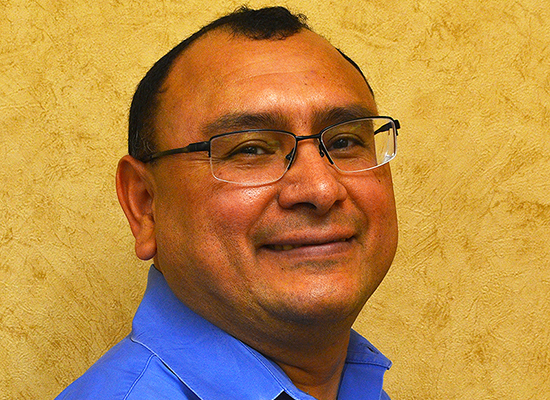
David Martinez honored for his dedication to supporting Illinois children with special healthcare needs and their families
David Martinez is the 2022 recipient of the Merit Award from the University of Illinois Chicago’s Division of Specialized Care for Children (DSCC).
The award recognizes exceptional employees for outstanding dedication and service to Illinois children with special healthcare needs and their families.
David is a Care Coordinator in the Chicago Central Office. In this role, he helps families develop personalized care plans for their children’s unique needs and connects them to the right services and resources.
“David has a remarkable ability to partner with our participant families and empower them to help reach their full potential,” DSCC Executive Director Thomas F. Jerkovitz said. “He works with families from a variety of cultural backgrounds and helps them feel understood and able to navigate the systems involved in their child’s care.”
David’s Chicago teammates say he has a talent for helping families and working “magic” in situations where others might not see a way.
“He is culturally sensitive, proactive and able to put himself in other people’s shoes so that he can better understand their situation and how best to partner with them to find a solution,” said Assistant Director of Research and Practice Initiative and former Chicago Central Regional Manager Patricia Perez.
David is a licensed clinical social worker. He grew up in El Salvador and studied criminal justice after coming to the United States.
He provided substance abuse programs at the Cook County Jail before deciding to pursue social work. This decision stemmed from his desire to help others and make an impact on families as early as possible.
David worked in mental health before joining DSCC in April 2016. He says he is honored to work for DSCC and with his amazing colleagues and managers in the Chicago Central office.
“Building strong relationships with my co-workers and the families we serve energizes me every single day,” David said. “Our families’ needs go beyond just medical. Every day is an opportunity to look at a situation from all different aspects and find a solution that can meet their needs. Sometimes it’s as simple as just listening.”
David said his DSCC career has helped him learn about many different cultures and that care coordination is not one-size-fits-all.
“Meeting the family where they are – that’s my starting point,” David said. “When I’m meeting with families, I tell them we are a team.”
David has helped achieve many successful outcomes for his participant families. In early 2022, he secured a $36,000 grant through the Guaranteed Rate Foundation to purchase and install a vehicle wheelchair lift in a participant family’s van and to make their bathroom wheelchair accessible.
But David says his proudest achievements are the relationships he builds with families.
“It would be impossible for me to deliver my passion in social work without having a relationship with families and open communication,” David said. “To be able to talk to families on a monthly basis and help them navigate through issues in life, that is my biggest accomplishment — having the trust the families place in me and DSCC.”
Our DSCC team nominated a total of 12 of our colleagues for this year’s Merit Award. As the winner, David receives a Merit Award memento, a $2,500 award and recognition from the Executive Director.
The other 2022 nominees are:
- Melissa Croft, Home Care Enrollment Specialist, Lombard Regional Office
- Christina “Tina” Glim, Care Coordinator, Mokena Regional Office
- Kristin Grubb, Administrative Aide, Peoria Regional Office
- Becky Helmink, Program Coordinator Assistant, Olney Regional Office
- Paula Holaday, Home Care Quality Improvement Specialist, Peoria Regional Office
- Marlo Johnson, Human Resources Officer, Central Administrative Office in Springfield
- Amy Jones, Regional Manager, Olney and Marion Regional Offices
- Danielle Osburn, Home Care Claims Process Lead, Central Administrative Office in Springfield
- Elma Saladar, Care Coordinator, Chicago Central
- Cindy Saxsma, Administrative Aide, Central Administrative Office in Springfield
- Katherine Serrano, Care Coordinator, Chicago Core
Congratulations, David! And a big thank you to all the nominees for their excellence on behalf of our participants and their families!
2022 Transition Conference Prepares Youth With Disabilities for Adulthood
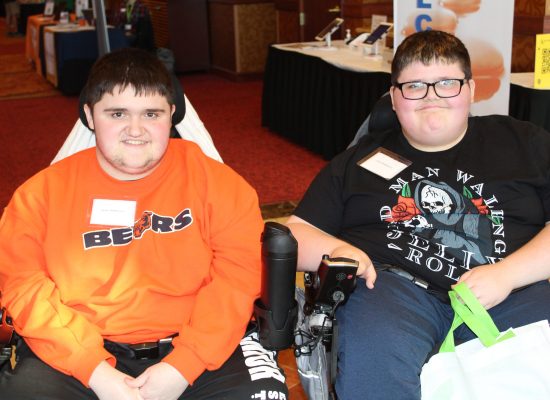
The annual Stepping Stones of Transition Conference gives families and professionals valuable resources and information to support youth on the path to adulthood.
Sixteen-year-old Ayla Etheridge says she’s faced many surgeries and physical limitations throughout her life.
She was born with a spinal lipoma (a mass of fatty tissue) and has experienced nerve damage and scoliosis. At one point, she needed a tracheostomy to breathe.
Ayla now uses a wheelchair and credits her physical challenges with “making my brain better.”
“I always bounce back and don’t want to just sit around and get depressed,” she said.
Ayla is also a careful planner, extremely tech-savvy and loves gaming, character design and writing.
As she attended the Illinois Statewide Transition Conference, Ayla thought more about how these interests and skills will shape her future and career goals.
“I’m very independent and would like to do more things myself,” Ayla said. “This conference has kind of helped me visualize and think about my next steps.”
The 17th annual transition conference, titled “Stepping Stones of Transition,” took place in East Peoria on Nov. 3-4. The conference helps both families and professionals learn about the resources, information and opportunities available for youth with disabilities as they prepare for adulthood.
Ayla and her mom, Rachel, were among nearly 450 people who attended in person.
The University of Illinois Chicago’s Division of Specialized Care for Children (DSCC) helps sponsor the conference and serves on its steering committee.
DSCC also covered the related costs for 34 of our participant family members to attend, including the Etheridges and the Barraza family.
“I am so thankful to DSCC for the fact they covered the cost to be here. That made a big difference in us being able to attend,” Anita Barraza said.
“Education empowers me”
Anita’s son, Daniel, 17, is a DSCC participant. His older sister Diana, 22, left DSCC last summer.
All three attended together along with dad, Jose, and Anita’s mother-in-law, who helped care for Daniel and Diana when they needed a break from conference activities.
“It was great to have my husband be able to be part of the process and that both he and I could listen and take in the information,” Anita said. “(The conference) is also a nice way to spend time together as a family. It’s almost like a mini-vacation for us.”
Anita is an occupational therapist who works with school children, so she understands both sides of the need for information and resources when supporting young adults with disabilities.
“As a parent, we can feel so overwhelmed. Even if help is right there, that reach can be hard to do,” Anita said.
That’s why opportunities to learn about a variety of resources and network with other families and professionals are so important.
“These types of resources educate me on how to best provide for my children’s needs and for their future,” Anita said
Both Daniel and Diana have significant medical needs and are unable to safely live on their own.
Anita says it’s hard to think about, but she realizes must start planning for who can care for Daniel and Diana when she and her husband can no longer do it. Residential placement may be necessary in the future.
The Barrazas also want to learn about possible day programs that can offer one-on-one support to Diana and possible employment options that would work well with her needs.
“Education empowers me to be better prepared to help (Diana and Daniel) have a good quality of life,” Anita said.
“One step ahead”
Anita had told two other DSCC moms about the conference and encouraged them to attend. One of those moms is her friend Yessy Castillo.
Though Yessy’s son, Jacob Ortiz, is only 4 years old, she knew it was important to go.
“I want to be aware of what services are available for Jacob,” Yessy said. “Most importantly, I want to be one step ahead. This conference allows me to get the information on what can benefit Jacob.”
Jacob was born with a cleft palate, an underdeveloped jaw and his tongue pushed back toward his throat. He also had malformations in his hands and feet, and his intestines did not rotate appropriately.
Jacob now has a tracheostomy and depends on a ventilator 24-7 to breathe.
“I appreciate getting the opportunity to meet people and attorneys for advice and support and more legal information on Jacob’s rights,” she said. “If I was not exposed to these events, I wouldn’t know what is available.”
While Yessy speaks limited English, she said the presentations all gave information in a way she could understand.
Melania Tinoco, who also speaks Spanish and learned about the conference from Anita, said connecting with other families at the conference helps her feel more confident.
“It helps seeing we’re all in the same boat and finding out we aren’t alone,” Melania said.
Her daughter Jeny is 14 and has been a DSCC participant since birth. Jeny has Pitt-Hopkins Syndrome, a rare genetic and neurological condition that causes developmental delays.
Melania said the conference has helped her plan for what happens to Jeny if she gets sick and/or can’t take care of her daughter. She also appreciated the breakout sessions on helping youth with disabilities respect their body and feel empowered to say “no.”
“The information has been helpful and inspirational,” Melania said.
Putting information into action
The conference consisted of informative breakout sessions in the areas of employment, education, health care and more.
DSCC participant Vera Lynn Lindquist, 17, and her grandmother, Cheryl Lindquist Calcese, said they enjoyed the “Awareness and Transition Services for Students with Disabilities” session. It gave them helpful information on sex education and tips for building good money management skills.
Cheryl is Vera’s legal guardian. She and Vera planned to start a new budget at home after the conference. Vera will get paid for doing chores, such as cleaning her room, helping with the laundry and feeding her two dogs and cat. She will also get a debit card so she can buy things and track her spending.
Vera has autism, attention-deficit hyperactivity disorder, anxiety disorder from childhood, tinnitus and hearing loss, and seizures.
She enjoys being an advocate, helping others and encouraging everyone to be kind.
During the breakout session, “Your Story Has Power: Great Expectations and Pieces of the Self-Advocacy Puzzle,” Vera stood up and actively participated during the presentation.
Vera and Cheryl hope to attend the transition conference again next year.
DSCC participant Sabrina Doueihi, 20, was among several self-advocates who shared their perspectives during the “Transition Success Stories” breakout session. She is currently a junior at Bradley College, where she is studying criminology. She hopes to go to law school and become a prosecutor.
Sabrina spoke about the importance of staying true to yourself and what you want to do. She also recommended that youth with disabilities focus on what they can do and who can help them achieve their goals.
“Trade stories and network”
For brothers Jaysen and Justen McMenamin and their parents, the transition conference was a good opportunity to plan for life after high school.
Jaysen McMenamin, 18, is a senior at Woodland High School near Streator, where he is an honor roll student and honorary captain of the school’s football team.
He says he’s interested in digital media and related job opportunities. But, he’s still deciding on the path that’s right for him after graduation.
Justen, 14, is a freshman at Woodland High and interested in coding. Both brothers have Duchenne Muscular Dystrophy and are enrolled with DSCC.
Their stepfather, Charles Cusick, said the family wanted to learn more about jobs and career fields that are accessible for the boys and provide more opportunities than what’s available in their small community.
They were also seeking information about camps and other recreation programs for Jaysen now that he has aged out of other programs.
The brothers enjoyed talking with some of the vendors about college resources, job coaching and training programs, and future housing opportunities.
Jaysen would like to live on his own but needs to make sure he has the right supports in place.
The brothers’ mom, Deanna Cox, said she appreciated the breakout session on Supplemental Security Income (SSI) benefits. Jaysen and Justen’s dad passed away in June, and the session helped her better understand how to help her boys keep the benefits they’re entitled to.
The family met up with their DSCC Care Coordinator Kristin Lenover during the conference.
“If families can get away from work, there’s so much they will get out of being at the transition conference,” Kristin said. “Attending in person gives you so much access to all kinds of information. There are also opportunities to meet other families, trade stories and network.”
Thirty DSCC team members attended the conference to network, learn from others and strengthen their skillsets and tools to serve participant families.
DSCC also sponsored the conference’s healthcare track for providers who play a role in the transition from the pediatric to adult healthcare system and those who build youth’s capacity and healthcare skills to prepare for adulthood.
DSCC Transition Specialist Darcy Contri has helped plan the conference since it began 17 years ago. This year’s event was her last before she retires.
“I’m so grateful for and have loved being part of this great work,” Darcy said. “Partnering with talented people from organizations across the state to help others has made a positive difference in so many lives. It is my hope the annual conference will continue to make an impact on improving adult outcomes for youth with disabilities for many more years.”
Visit our Facebook page to see more photos from this year’s conference.
Share Your Feedback on the Nursing Allocation Process
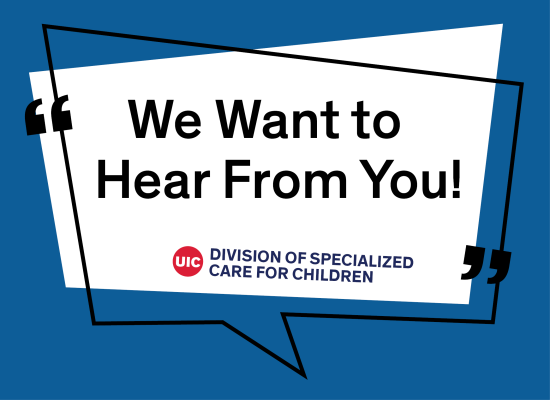
Help our Family Advisory Council recommend changes that can benefit Home Care Program participants and their families.
The Division of Specialized Care for Children (DSCC) helps coordinate and monitor in-home nursing for families through the Home Care Program.
The Illinois Department of Healthcare and Family Services (HFS) determines the number of approved nursing hours after reviewing the individual’s medical reports and medical needs.
Our Family Advisory Council (FAC) now wants to help families better understand the process for how HFS assigns nursing allocations. The FAC also wants to help HFS understand the unique needs and circumstances of Home Care families when deciding nursing allocations.
FAC Advocacy Chair Whitney Woodring is putting together a Nursing Allocation Workgroup to gather feedback on these issues. Whitney’s daughter Willa has received Home Care services since she was a baby. (See Willa’s Family Story for more details.)
Whitney hopes to speak with families across Illinois to learn about their experiences with nursing allocations and the appeal process.
You can email Whitney directly with feedback at w.woodring25@gmail.com.
Whitney would like to hear all input, including positive experiences with the process.
Your feedback will help Whitney and the FAC make recommendations for changes that can benefit as many participants as possible.
To learn more about the FAC, visit our Family Advisory Council page. Be sure to also join the FAC’s next open forum meeting on Nov. 10.
Need more information about nursing services and allocations?
Our Nursing Services Tip sheet gives an overview of Medicaid’s nursing services to help families in the Home Care Program take care of their child’s medical needs:
Our Home Care Appeal and Peer-to-Peer Review Tip Sheet explains how the review and determination of medical eligibility for Home Care services work:
- Appeal and Peer-to-Peer Review Tip Sheet in English
- Appeal and Peer-to-Peer Review Tip Sheet in Spanish
You can find these handouts and other helpful information for families on our Home Care Information Hub.
DSCC Partners with Fowler Bonan Foundation to Offer Back-to-School Shopping Spree for Family in Need
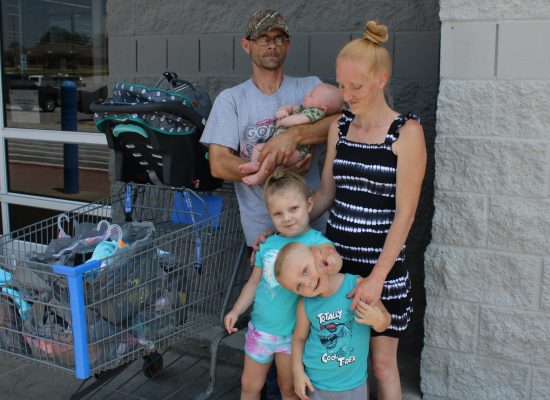
Fowler Bonan Foundation, a southern Illinois nonprofit, worked with DSCC’s Marion Regional Office to provide shoes and clothing for participant Renesmae and her two younger siblings
Renesmae is an outgoing 5-year-old who loves unicorns. She recently started kindergarten with extra sass and confidence thanks to new unicorn outfits and orthotic shoes for the school year.
Renesmae and her two younger siblings received a free back-to-school shopping spree for these much-needed items and more from the Fowler Bonan Foundation.
Renesmae’s care coordination team from the University of Illinois Chicago’s Division of Specialized Care for Children (DSCC) partnered with the foundation to make the special shopping trip possible,
“There’s a lot going on. With the kids starting school, we just didn’t know what we were going to do,” her mother, Misty, said during the shopping trip.
“Everyone at DSCC is really nice. They help with rides to the doctors and other things, but we never expected this. I can’t believe we’re shopping! It’s just above and beyond.”
A family in need
Renesmae has been a DSCC participant for most of her life.
“She had viral meningitis and severe seizures when she was 2 months old,” Misty said. “She has partial paralysis on her right side, can’t open her right hand on command or raise that arm very high, and limps or drags her foot when she walks. Thankfully, she hasn’t had any seizures in a while.”
Renesmae also has hypertonia, which makes her muscles stiff and difficult to move, and homonymous hemianopsia, a condition that causes her to see only one side of the visual field of each eye.
Misty describes Renesmae as “outgoing and not one bit shy.”
“She’s my absolute handful and, like the country song says, can be ‘t-r-o-u-b-l-e,’” she said. “She’s also a great big sister and is always doing stuff for her little brothers. She’s such a mother hen to Liam and Aries.”
Liam is an infant, and Aries is 3. Aries is now starting Head Start, a program that promotes school readiness.
Renesmae’s DSCC care coordination team includes Care Coordinator Cheryl Golliher and Program Coordinator Assistant Renee Woodson. They partner with Renesmae’s family to find treatment options, transportation to appointments and other services to help Renesmae thrive.
“The family let me know they needed help getting her orthotic shoes,” Cheryl said. “Renesmae wants to be like every other kid. The shoes look like any other pair of shoes but are different sizes and fit her brace. The shoes are an important part of keeping her focused on positive things, not other distractions.”
As Cheryl and Renee looked for options for Renesmae’s footwear, they learned all three siblings needed new clothes and shoes for the school year.
A local nonprofit ready to help
Our DSCC care coordination teams can help our participant families find community funding opportunities and resources to meet these important needs.
Amy Jones, DSCC Regional Manager for our Olney and Marion offices, and her team contacted the Fowler Bonan Foundation to see if they could help Renesmae’s family. The foundation provides clothing and shoes to low-income children through their Clothes for Southern Illinois Kids initiative.
“They agreed to help buy clothes and shoes for all of the children and asked that we join their volunteers to help the family shop,” Amy said. “We contacted the family and worked with the foundation and our team to get everything set.”
Bobbie Fox is a Fowler Bonan board member who began volunteering with the organization nearly two decades ago.
“My family was new to the area, and I worked as a store manager. Back then I did all the shopping for our families on my lunch break,” Bobbie explained. “Now, more people know about us and that we offer help in 17 counties throughout southern Illinois. We work with local organizations, community businesses, teachers and others to fundraise and make sure that every bit goes out locally to reach our families and help kids.”
Time to shop
Everyone met at Walmart in Anna on July 20 for the shopping trip. The group included Renesmae’s family – her parents, Misty and Jerry, and little brothers, Liam and Aries – and Bobbie from the foundation and her daughter, Saylor.
Cheryl and Renee were unable to attend. Their teammate Jimmy Baldi, a DSCC Program Coordinator Assistant from the Marion office, volunteered to join the group and help shop.
The first stop was the shoe department. Mom and dad located the right sizes, but the kids had a tough time deciding with so many options to choose from. Renesmae selected Minnie Mouse sandals. Aries went with the Batman sneakers.
“We want to be sure that the kids have shoes and other essentials, such as socks and underwear, in addition to everyday clothes,” Bobbie explained. “The foundation typically provides $100 to $150 for each child to cover these needs.”
A team effort and “win-win for all”
Everyone did their part to help Misty and Jerry feel comfortable and find items the kids needed.
The group took turns hunting for unicorns and superheroes (Aries’ favorite), suggesting styles and finding the right sizes.
Everyone’s efforts were worth it. At the checkout, the kids were happy campers and Misty couldn’t believe they each had five new outfits for school along with plenty of underwear and socks.
Jimmy even snuck in some baby time with Liam.
“I’m really amazed and just so thankful to the foundation and everyone,” Misty said. “These will be hidden away until school starts so that they don’t get messed up.”
As the shopping trip ended, Bobbie exchanged high fives with Renesmae and got a big hug from Aries.
“It’s such a joy to be able to do this,” Bobbie said. “The focus on the kids, partnering with other organizations and individuals. It’s a team effort and a win-win for all.”
The Fowler Bonan Foundation also ordered Renesmae’s orthotic shoes. Jimmy later traveled to the foundation’s headquarters in Harrisburg to pick them up. Cheryl delivered the shoes to the family.
What started as a team effort, ended as a team effort.
“The Foundation is a great resource and so quick to respond to the needs of our families,” said Cheryl. “The shopping trip helped relieve so much stress and worry for the family. It was a great team effort in every sense of the word. I hated to miss the shopping trip, but Jimmy volunteered to go and really loved going.”
We’re thrilled our Marion Regional Office team and the Fowler Bonan Foundation came together to support Renesmae’s family. A big thank you to Fowler Bonan for providing the generous shopping spree!
If you would like to volunteer to help the foundation or know of a family or child in need, please contact them at FowlerBonanFoundation@gmail.com.
You can see more photos from the shopping trip on our Facebook page.



